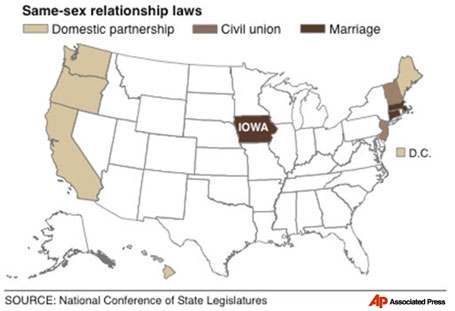Last Friday, the Iowa Supreme Court in a unanimous decision ruled in favour of same-sex marriages - the third state after Massachusetts and Connecticut on the East coast. More often debated on both coasts, the decision makes Iowa the first state in the American Midwest, an area often referred to as the "American Heartland," to grant marriage rights to same-sex couples. For five months last year, California's high court allowed gay marriage until November's election, when residents rejected the idea in a voter initiative. A ruling on the validity of that initiative is expected soon from California's Supreme Court.
Couples in Iowa are expected to be able to exchange vows as soon as April 24 and reports say the only recourse for opponents appears to be a constitutional amendment, which couldn't get on the ballot until 2012 at the earliest.
The Iowa Supreme Court on Friday unanimously upheld a lower-court ruling that rejected a state law restricting marriage to a union between a man and woman. It wrote in its 69-page decision: "We are firmly convinced the exclusion of gay and lesbian people from the institution of civil marriage does not substantially further any important governmental objective." The state's lawmakers "excluded a historically disfavoured class of persons from a supremely important civil institution without a constitutionally sufficient justification."
The Associated Press quoted Justice Mark S. Cady, a Republican appointee to the court, who said that excluding a group from marriage merely because of long-standing custom, can "allow discrimination to become acceptable as tradition."
Reports say same-sex marriage opponents may try to enact residency requirements for marriage so that gays and lesbians from across the country could not travel to Iowa to wed.
US Rep. Steve King, R-Iowa, urged the Legislature to do so, saying he feared without residency requirements Iowa would "become the gay marriage mecca."
Meanwhile, in Vermont, the state House of Representatives approved a bill last Friday legalising same-sex marriage. The bill passed the state Senate on a 94-52 roll call vote, just short of the two-thirds majority needed to override a promised veto by Republican Gov. Jim Douglas. Gay marriage supporters hoped to convince a few Vermont legislators to switch when it comes to the override vote, which could be taken as soon as Tuesday.
Iowa State Senator Matt McCoy, the first openly gay member of the Iowa Legislature, describes why he thinks Iowa won't go backwards on marriage rights.
In the media:
Unanimous ruling: Iowa marriage no longer limited to one man, one woman (desmoinesregister.com): Basic fairness and constitutional equal protection were the linchpins of Friday's historic Iowa Supreme Court ruling that overturned a 10-year-old ban on same-sex marriage and puts Iowa squarely in the center of the nation's debate over gay rights…
The landmark ruling is guaranteed to send shock waves through politics in Iowa and beyond. With no appeal as an option, opponents say their only hope to overturn Friday's decision is an almost-certain bid to amend the state constitution. But that path, which would eventually require a public vote, would not yield results until 2012 at the earliest.
The Meaning of Iowa's Gay Marriage Decision (time.com): When the Iowa Supreme Court ruled on Friday that gays can marry in the Hawkeye State, gay marriage became not just a coastal thing. Deep in the rural heartland, a straightforward opinion - written by a justice appointed by a conservative Republican governor - methodically eviscerates one argument after another that for decades has been used to keep marriage the sole preserve of straight couples. "This class of people asks a simple and direct question: How can a state premised on the constitutional principle of equal protection justify exclusion of a class of Iowans from civil marriage?" Justice Mark S. Cady asked.
The answer? It can't.
Marriage in the heartland (sfgate.com): Still, it's obvious that Friday's decisions represent a leap forward, not just a step. Vermont's bill recognizes that only marriage represents true equality. And Iowa isn't Connecticut or Massachusetts or even California - it's the heart of the heartland, the country's classic swing state.
The next few years will give both Iowans and the rest of the country the opportunity to witness how same-sex marriage can bring greater fairness for everyone.
Justice Mark S. Cady, appointed by a conservative Republican governor, wrote in the majority opinion that "the constitutional principle of equal protection" forbids the "exclusion of a class of Iowans from civil marriage."
The ruling "does not disrespect or denigrate the religious views of many Iowans who may strongly believe in marriage as a dual-gender union," Cady wrote. But the majority must nonetheless provide equal protection. "We are not permitted to do less and would damage our constitution immeasurably by trying to do more."
California ruling helped Iowa OK gay marriage (sfgate.com): Frequently citing the California ruling, the Iowa justices said any law that denies equal treatment to a historically persecuted group, like homosexuals, is valid under the state Constitution only if it promotes an important, legitimate government goal. They said none of the goals cited in defense of the marriage law - tradition, protecting children, encouraging procreation - met that test…
Claims that children are better off with opposite-sex parents are scientifically unproven, he said, and, even if true, would not be served by denying marriage to same-sex couples who are already raising children… (Justice Mark) Cady said, neither evidence nor common sense supports the notion that limiting marriage to opposite-sex couples would encourage those couples to have more children or make their unions more stable.

6 Apr 2009
Iowa becomes third US state to legalise same-sex marriage
Iowa became the third state in the country to legalise same-sex marriage on Friday while Vermont's bill - although passed - is short of the two-thirds majority needed to override a promised veto by Republican Gov. Jim Douglas.
